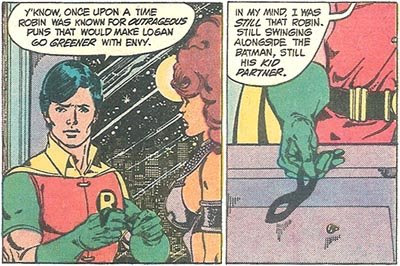Robin Changes His Sense of Humor
 The last two weekly Robin installments discussed how the Boy Wonder offered refreshing comic relief in the early Batman stories, and how the jokes he inflicted on the magazine's bad guys became an explicit part of his personality.
The last two weekly Robin installments discussed how the Boy Wonder offered refreshing comic relief in the early Batman stories, and how the jokes he inflicted on the magazine's bad guys became an explicit part of his personality.
But as time went on, that characterization became embarrassing--especially after Burt Ward's "Holy hand grenades, Batman!" portrayal of Robin on TV. Superhero comics in the 1970s swerved away from that camp, trying to show heroes with deeper and more realistic personalities (even as they continued to find themselves in unrealistic situations).
Furthermore, when Dick Grayson had solo adventures or led the Teen Titans, he stopped being the comic relief. Sure, he still had a sense of humor, but in the New Teen Titans series of the early 1980s the character who cracked lame jokes was Garfield Logan, a/k/a Changeling (previously and later called Beast Boy). So what could scripter Marv Wolfman do with Robin's famous puns? Punning became a trait and symbol of Dick Grayson's departing youth. When Dick gave up his identity as Robin in New Teen Titans, #39, he not only took off his mask, but he also set his juvenile jokes in the past.
Punning became a trait and symbol of Dick Grayson's departing youth. When Dick gave up his identity as Robin in New Teen Titans, #39, he not only took off his mask, but he also set his juvenile jokes in the past.
There was a new young Robin at the time, the first Jason Todd. He tended to be more serious than Dick Grayson had been in previous decades, but superhero comics overall were more serious. More interesting shifts in Robin's sense of humor began with the introduction of the second Jason Todd after DC's Crisis on Infinite Earths (1985-86). As the panel to the right shows, scripter Mike W. Barr had a very traditional view of Robin, and wrote Jason as the humorous half of the Dynamic Duo. But his collegues Max Allan Collins and Jim Starlin and editor Dennis O'Neil saw more dramatic potential in making Jason an angry Robin. His sense of humor shrank, and the tone of his jokes was bitter.
As the panel to the right shows, scripter Mike W. Barr had a very traditional view of Robin, and wrote Jason as the humorous half of the Dynamic Duo. But his collegues Max Allan Collins and Jim Starlin and editor Dennis O'Neil saw more dramatic potential in making Jason an angry Robin. His sense of humor shrank, and the tone of his jokes was bitter.
In short, Jason Todd's character stopped embodying some of the traditional "Reasons for Robin." And in late 1988 comic-book readers decided to kill him off. The next Robin, Tim Drake, was also more serious than Dick Grayson. But instead of angry, he was endearingly uptight. As his comrade and occasional girlfriend Spoiler notes in the panel to the left, when Tim acts tough and shoots off snappy jokes like Dick, it comes across as trying too hard.
The next Robin, Tim Drake, was also more serious than Dick Grayson. But instead of angry, he was endearingly uptight. As his comrade and occasional girlfriend Spoiler notes in the panel to the left, when Tim acts tough and shoots off snappy jokes like Dick, it comes across as trying too hard.
Tim Drake as Robin still lightened Batman, but with emotional openness, not with broad jokes. On his teams, first Young Justice and then a reconstituted Teen Titans, Tim's Robin tended to be straight man. It's unclear how humor will play a role in his new identity as Red Robin. Meanwhile, yet another Robin made his debut this month, little Damian Wayne. As I've discussed before, the moral and emotional dynamic of Batman (now Dick Grayson) and Robin has been reversed.
Meanwhile, yet another Robin made his debut this month, little Damian Wayne. As I've discussed before, the moral and emotional dynamic of Batman (now Dick Grayson) and Robin has been reversed.
What sort of humor can Damian brings to the Batman magazine? So far it all seems to be at his expense; we readers are encouraged to snicker at Damian's ego and excesses. Can he avoid the fate of the second Jason Todd?
NEXT WEEK: What Robin's jokes have come to mean for Batman.


No comments:
Post a Comment